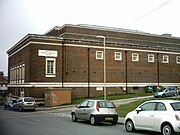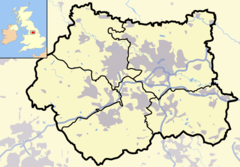- For the prison, see Leeds (HM Prison).
| Armley | |
 View of Armley Town Street |
|
| Metropolitan borough | City of Leeds |
|---|---|
| Metropolitan county | West Yorkshire |
| Region | Yorkshire and the Humber |
| Country | England |
| Sovereign state | United Kingdom |
| Post town | LEEDS |
| Postcode district | LS12 |
| Dialling code | 0113 |
| Police | West Yorkshire |
| Fire | West Yorkshire |
| Ambulance | Yorkshire |
| EU Parliament | Yorkshire and the Humber |
| UK Parliament | Leeds West |
| List of places: UK • England • Yorkshire | |
Armley is a district in the west of Leeds, West Yorkshire, England. It starts less than a mile from Leeds city centre. Like much of Leeds, Armley grew in the industrial revolution and had several mills, one of which is now the Armley Mills museum. Armley is now a largely working class area of the city, which still retains many smaller industrial businesses.
Location[]
It is between the M621 motorway and Kirkstall Road, stretching from roughly the New Wortley roundabout (aka Armley Gyratory) to around the start of the Stanningley By-pass/Cockshott Lane where it merges into Bramley. Armley is mentioned in the 1086 Domesday Book as Ermelai.[1]
Armley is a predominantly and historically working class area, including many rows of back-to-back terrace houses. It is traditionally a strong Labour area, although current Labour policies, voter apathy and the creeping gentrification from Headingley (via Burley) is beginning to erode the landslide-style victories of yesteryear.
Amenities[]

Shops on Town Street

Armley Library
Armley Town Street includes a couple of high street names and charity shops as well as independent retailers typical of a suburban high street. There is especially good coverage of food retailers, plus excellent bus links into Leeds, Bradford, Halifax and Huddersfield. Armley's Town Street has been praised for its large amount of free, off-road car parking, something unusual amongst inner-city and suburban high streets. Armley's parking is however mainly on-street and there are few car parks in the centre. Armley's only supermarket is a Somerfield on Town Street, neighbouring Wortley has a Netto (formerly Asda), while neighbouring Bramley has Tesco (formerly Safeway), Morrisons and Farmfoods.
Other features of Armley include Armley (Gott's) Park, HM Prison Leeds, formerly known as Armley Gaol, Gott's Park Golf Club and Armley Mills Leeds Industrial Museum, plus numerous former cinemas and churches. The most notable of the former churches is the old Methodist chapel which is now owned by Mike's Carpets, and is a familiar landmark to the people of West Leeds. A similar chapel in Holbeck is also in use as a carpet shop. There are large industrial units that are home to flooring company Lifestyle Flooring UK, Wortley Hydroponics, J&S Coatings, Christie's Tailors, and SICL IT support.

Armley Sports and Leisure Centre
Armley's large leisure centre, which features a glass roof over the swimming pool as well as a large mezzanine level surrounding the whole pool, is scheduled for demolition once the new leisure centre has been opened. Construction of the new leisure centre (which is being situated adjacent to the existing one) began in late 2008. The closure of Armley's existing facility has attracted some controversy because of the age and local architectural significance of the building. Despite being a large building, the current facility only houses one 25-metre swimming pool with much redundant and unused space. Morley and Beeston are also getting new leisure centres under the programme being run by Leeds City Council.
Transport[]
Since the closure of both Armley's railway stations (Armley Canal Road and Armley Moor), the only public transport is by bus. The nearest railway stations are Bramley to the west and Leeds City railway station to the east. Buses in Armley are operated by First Leeds and include the 16, 40 and 40A services linking Armley with Leeds city centre, Bramley, Pudsey, Harehills, Seacroft and Gipton. The Armley Gyratory is a major intersection of roads and lies to the east of Armley, the end of the A58(M) Leeds Inner Ring Road is on this roundabout, while the Ingram Distributer links it to the M621, the A647 stems from here and heads towards Bradford while the B6145 heads from here through Wortley and Pudsey. Although Armley has no railway stations, the line from Leeds to Bradford Interchange and Halifax still passes through it.
History[]

Armley Mills Industrial Museum

St. Bartholomew's Church, Armley
The first mention of the settlement is in 1086 in the Doomesday Book, at the time there were 8 villagers in Armley and Reestones (the locality now known as Wortley). The actual population is indetriminable as this only accounts for the 'head of household'.[2]
Armley Mills, now the Armley Mills Industrial Museum, was the World's largest Woollen Mill when it was built in 1788. In the 18th and 19th centuries Armley was, through its mills, a major contributor to the economy of the city of Leeds. Many of the buildings still standing in and around Armley were built in the 1800s, including many of the churches, schools, shops and houses. Ledgard Way is named after the late Armley entrepreneur Samuel Ledgard. Armley also has picturesque views over the rest of Leeds from certain vantage points. William Tetley started his business of malters in Armley in 1700, from this Joshua Tetley formed the Tetley's brewery in 1822.

Burnsall Croft flats.
From the 1870s until 1956, Armley was home to the J W Roberts asbestos mattress and boiler lining factory. This facility exposed local residents to fibres of asbestos and resulted in a mesothelioma cancer cluster in the area which persists to this day. One of the victims of the disease, June Hancock launched a court action in 1993 against Turner & Newall, the company that owned the J W Roberts' factory. Although the court case was successful, corporate restructuring has avoided the case being settled to this day.[3] Hancock's story formed the subject of a play, Dust, by Kenneth F. Yates, which was performed in Armley and at the West Yorkshire Playhouse in July 2009.[4]
The parish church, St. Bartholomew's, is home to one of the finest pipe organs in the UK, built by the German organbuilder, Edmund Schulze. Originally built for Meanwood Towers in 1866-9, it was opened by S.S. Wesley. It was moved to St Bartholomew's in 1879. Schulze's work, and this organ in particular, had enormous influence on the development of British organ building in the nineteenth century, bringing it back into the mainstream after a period of insularity. Both church and organ have recently been restored.
Legend has it that a pedlar called Charlie used to rest and water his pony and trap in Whingate Park in the 19th century. He apparently sold spicy shortbread to the citizens of Upper Armley for 1d a piece. Today the triangular-shaped park is known by all as Charlie or Charley Cake Park. According to Armley Through the Camera, written in 1901, the park was "within memory of many present residents of Armley, a patch of wasteland. Some of them regularly played cricket on its turf"[5]
There were two railway stations in Armley. Armley Moor station closed in 1966 and Armley Canal Road station on 22 March 1965.
Housing[]

Westerly Croft

A view of Western Armley
Armley exhibits a variety of housing, from the Victorian back-to-back and through terraces, through to the large blocks built by the council in the centre of Armley following slum clearance schemes. There are few houses in Armley that post-date the 1960s. Armley's housing stock is mostly private built, however it does have a substantial supply of council houses. Many of the tower blocks in Armley and neighbouring Wortley are amongst the tallest corporation residential blocks in Leeds (exempting Cottingley). Many previous back to back houses have been converted into through terraces throughout the decades.

Snow on the rooftops in Armley during January 2010.
Notable references in popular culture[]
Celebrities from Armley include author Barbara Taylor Bradford, playwright Alan Bennett and anarchist rock band Chumbawamba who for some time lived in a communal household in the district. The tank scene in the 1963 movie Billy Liar was filmed in Wellington Road, Armley, and local residents were used as extras. More historically, many of Yorkshire's great textile giants, such as Benjamin Gott, were born, lived, died and/or were buried in Armley.
A street in Armley- St Ives Mount won the accolade of Friendliest Street in Britain As reported by the Daily Mirror in by the listeners of BBC Radio 5 Live at the end of 2006 with over 56% of the vote. Radio Five Live
Location grid[]

|
Kirkstall | 
| ||
| Bramley | Holbeck | |||
 Armley | ||||
| Wortley |
References[]
- ^ http://books.google.co.uk/books?id=nug5AAAAMAAJ&pg=PA184&lpg=PA184&dq=Ermelai&source=bl&ots=ubeu2I-fIK&sig=UftCIXU7Vd3AhyiN4fNCmqKF-zM&hl=en&ei=vkALSru8KoXMjAeisfGVCw&sa=X&oi=book_result&ct=result&resnum=9
- ^ http://www.armleytoday.co.uk/yourarmley/Armley-Local-History.3741809.jp
- ^ Lazenby, Peter (6 October 2005). "Asestos: the final reckoning". Yorkshire Evening Post. http://www.yorkshireeveningpost.co.uk/features/Asbestos-The-final-reckoning.1213072.jp. Retrieved 2009-07-19.
- ^ Ahad, Nick (16 June 2009). "Echoes of Erin Brockovich as doughty campaigner for justice 'stars' in Dust". Yorkshire Evening Post. http://www.yorkshirepost.co.uk/highlights/Echoes-of-Erin-Brockovich-as.5371305.jp. Retrieved 2009-07-19.
- ^ Kirkby, T (1901) Armley Through the Camera, p.20, Hanson & Oak, Theaker Lane, Leeds.
External links[]
- YEP Armley Today Community Website
- Lifestyle Flooring UK, Armley, Leeds
- The ancient parish of Leeds: historical and genealogical information at GENUKI (Armley was in this parish)
- Photographs of the Leeds & Liverpool Canal at Armley, Leeds
- Leeds Industrial Museum at Armley Mills, Armley, Leeds
Further reading[]
- Kirkby T. (1901) Armley Through The Camera, Hanson & Oak, Theaker Lane, Armley, Leeds.
| |||||||||||||||||
| This page uses content from the English language Wikipedia. The original content was at Armley. The list of authors can be seen in the page history. As with this Familypedia wiki, the content of Wikipedia is available under the Creative Commons License. |

